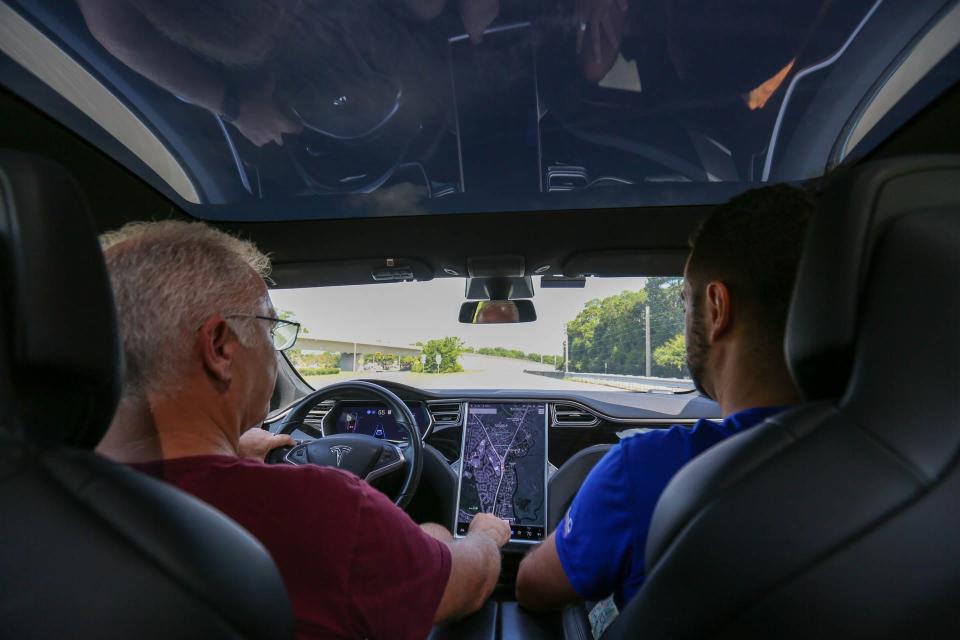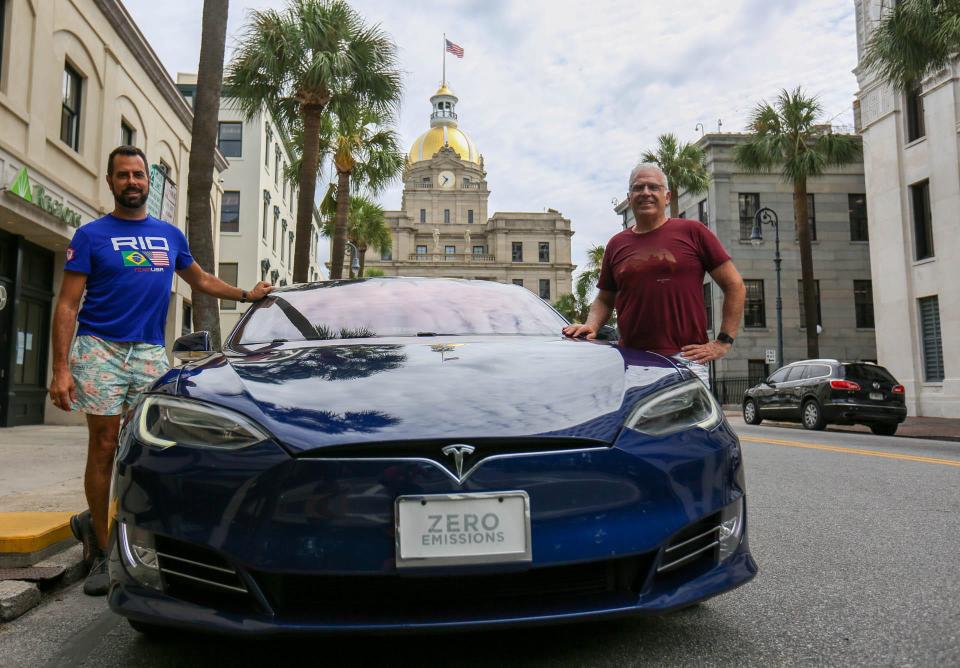Interest sparked? How Georgians are gearing up to adopt EVs ahead of Hyundai plant opening
Driving down I-95 or around downtown, Savannahians are starting to see more electric vehicles on the road. Behind the wheel, they might even see Rev. Steve Schulte, a local Lutheran preacher, driving the Tesla S75 he got five years ago.
“For me, it's the savings. In the long run, it's a lot of savings — now that I don’t have a car payment anymore I’m saving hundreds of dollars every month in just gasoline,” Schulte said. And he chuckled, “A fun fact — it’s probably an ego thing — it’s much faster than any other car on the street.”
With the Bryan County Hyundai plant getting ready to break ground, more coastal Georgians might be thinking about joining Schulte and taking the plunge and plugging into a new electric car of their own.
America's EV market: The race is on to meet consumer demand, and Hyundai is running fast
EVs and the environment: How electric cars are impacting emissions and climate change
The dawn of the EV age: Why drivers are embracing electric cars, soon to be made in Savannah

How many EVs are on the road?
Electric vehicles still make up a small proportion of the cars on the area’s roads: there are only 790 electric vehicles registered in Chatham County, although this number doesn’t include hybrid cars which have an electric battery and a gasoline engine. The numbers, collected from Georgia’s Department of Motor Vehicles registration data, show that Chatham County and surrounding counties all have under 1% of total cars registered as electric vehicles.
This trend isn’t localized to just south Georgia: EVs are still trying to break that 1% mark in Richmond County (Augusta), and in Cobb and Dekalb counties (metro Atlanta), although Fulton County’s electric vehicles have reached of 1.4% of all registered vehicles.
All charged up
EVs are the future of cars - and Savannah will be an EV epicenter as home to a Hyundai manufacturing plant. This multi-part series examines what has sparked the broadening embrace of these vehicles locally, nationally and around the globe.
Tuesday: The EV age and climate change
Wednesday: Consumers and automakers embrace EVs
Thursday: Charging stations and other EV challenges
With gas prices breaking records in recent months, more drivers are looking toward EVs as a way of saving money at the pump. Schulte said when friends lament the high gas prices he holds his tongue, but is always willing to talk about his experience with an electric vehicle. An early adopter of EVs, going green was really all about the green for him: saving money.
To drive one hundred miles in a Tesla, Shulte said it costs about $7 in the summer and $3 in the winter to “fill up” the car’s tank. Electricity prices in Georgia change during the year, Schulte noted — during peak summer months, when demand is far higher, Georgians pay a couple of cents more per kilowatt on electricity than they do during the winter.
Even with the seasonal changes, Schulte said that electricity prices are regulated by the state and are more stable than gas prices, so during the hiking prices this summer he’s been thankful to drive an EV. It used to cost him $100 every week to fill up his Mercedes SUV, which at the time seemed like a lot to him. Now he feels a bit silly saying that was a lot of money for gas.
Read More: Hyundai coming to Bryan County, Georgia with new electric vehicle plant in Ellabell
“When you factor in the cost of the gasoline, along with the cost of the servicing of the Mercedes or any gas vehicle it was cheaper for us to buy [a Tesla],” Schulte said.
Besides saving on gas, he said that he’s saved plenty of money on servicing. Teslas still have wheels, breaks and bumpers that may need repairs like any other cars. But under the hood, the Tesla doesn’t need oil changes or fixing for any hoses and belts and other fixtures of a gasoline engine — it’s all just a battery.
The savings didn’t always equate to convenience for Schulte as much as it does now. Back when he first got a Tesla, there wasn’t a dealership nearby, so anytime the car needed work Tesla would tow it to Jacksonville and back. Now, there's a Savannah Tesla location.
There also wasn’t as much of a robust network of charging stations as there is now. Today, Schulte said he can find chargers nearly everywhere, including parking garages and hotels. For Tesla owners who have the more expensive version of the vehicle, charging at super-fast, “supercharge” stations is free wherever they can be found.
Looking under the hood
Rolling off the street and into the maintenance shops, electric cars have been slow to arrive at local car service centers such as RPM Autoworx. Owner and CEO Rick Broussard said that his business, which has been servicing in Savannah for 15 years, has seen hybrid vehicles for many years but hasn’t had too many EVs come through.
There are a couple of reasons for this beyond the number of EVs on the roads: Broussard said that for software and battery repairs, companies almost always ask EV owners to take their cars to the company’s dealership — there’s software coding that only the dealership has technicians for. Additionally, when the battery reaches the end of its life, it’s expensive to replace.
What's the difference?: EV vs. hybrid vs. gas-powered cars
“The replacement cost of the battery for these hybrid cars is like so exorbitant that it’s like all the money that you save in gasoline is now being paid out to replace that battery pack,” Broussard said.
When the battery pack goes bad, Broussard said he’s had several customers decline work, and he doesn’t know where the car goes after that.
The battery life, according to Broussard, only about seven years or so. According to Tesla's website, its New Vehicle Warranty covers the battery for the first 8 years, or the first 100,000 to 150,000 miles depending on the model — whichever comes first.

Tesla's press office did not respond in time for publication to an inquiry about the price of replacement batteries.
A competitor, Mercedes-Benz said in a 2021 press release that replacing a lithium-ion battery runs in the low thousands, which it said "isn't too bad considering the cost of lithium-ion batteries was 80% higher a decade ago." It also stated the company is working to make new batteries that would reduce CO2 emissions and extend vehicle ranges.
“I’m all about it — I believe in trying to save and prolong the environment,” Broussard said. His building is LEED certified, meaning it met building criteria for environmentally friendly construction and operation and opened on Earth Day in 2008. A through-and-through car guy, he'll still admit there's still something he loves about the powerful thrum of a gasoline engine.
He’s interested in seeing how electric vehicles develop over the years, but one environmental concern Broussard has is that the material needed to make the batteries, the rate they may need to be replaced and how batteries will be disposed of might make the cars less environmentally friendly than they could be.
Outside of the battery, EVs still have brakes to replace and tires to rotate, plenty for maintenance shops to continue servicing. Broussard said that since the battery voltage is much higher, there is some additional training to keep workers safe.
He doesn’t know if he’ll start seeing a rapid increase in electric cars anytime soon, but he said he’s been glad to continue serving his customers who’ve made the switch and is looking forward to seeing where the car industry goes from here.
Marisa is an environmental journalist covering climate change and the environment on the coast. She can be reached at mmecke@gannett.com or by phone at (912) 328-4411.
This article originally appeared on Savannah Morning News: Georgians adopting EVs ahead of Bryan County Hyundai plant opening

